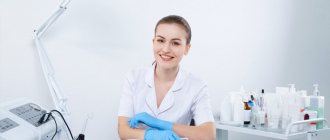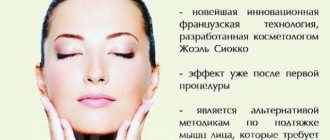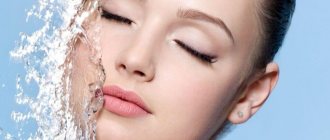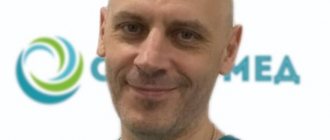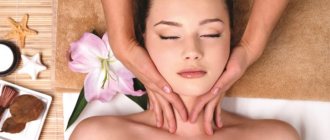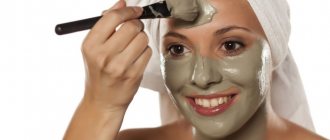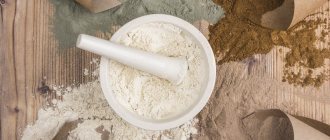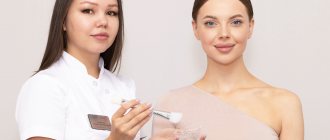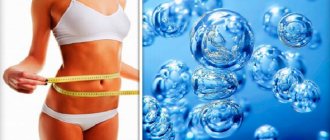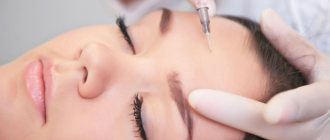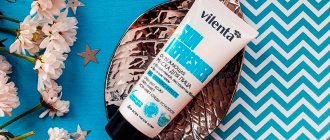Cryomassage is one of the methods of massage on the human body, during which a cold source is used. Cryomassage refers to procedures using moderately low temperatures, usually not lower than -20 degrees Celsius. The essence of the method is local indirect contact of the skin with a source of cold, most often with a device that produces liquid nitrogen, due to which the metabolic processes, consumption and transport of nutrients first slow down in the tissues, and then they are actively restored. Doctors and cosmetologists note that cryomassage has both cosmetic and therapeutic effects on the body.
What is facial cryomassage
Cryomassage is a technique that uses liquid nitrogen at a temperature of −196 degrees Celsius to provide anti-inflammatory and analgesic effects on the skin. The cosmetic procedure is almost painless; due to the action of nitrogen, blood vessels immediately expand and contract. The processes lead to rejuvenation of the skin, normalizing blood flow and renewing epidermal cells. Cryomassage of the face with liquid nitrogen does not cause severe discomfort, only a slight tingling sensation and a gradual increase in warmth.
History of cryomassage with liquid nitrogen
The analgesic effect of cold on injured areas of the body was known back in the days of Ancient Egypt. Doctors of that time used cold compresses to relieve pain from various fractures and bruises, as well as to relieve swelling. Over time, the beneficial properties of cold were developed by Hippocrates, Galen, and Avicenna in their medical works. All of them noted the healing effects of cold on the human body. The term “cryotherapy” was introduced into use in the 20th century by the German priest Sebastian Kneipp, taking as a basis the Greek “krios” - cold, cold. Kneipp developed cryotherapy into a separate method of treatment in physiotherapy, and used cold for diseases of the musculoskeletal system. But Japanese professor Toshimo Yamauchi went the furthest, who in 1984 developed and improved a unique massage technique. He began to use the possibilities of cryotherapy in the treatment of joints and the treatment of benign skin tumors.
The essence of cleaning
Under the influence of liquid nitrogen, the integument instantly cools, which leads to a sharp narrowing of the capillaries. After cooling, the particles of the substance freeze on the skin, helping to remove dead skin cells. The oxygen, vitamins and oxidants included in the mixture enrich and restore tissues. Then the vessels dilate, toxins, sebaceous secretions, and metabolic products are removed. As a result, microcirculation improves and the synthesis of elastin and collagen is activated.
The main difference from other types of cleansing is the ability to solve a whole range of aesthetic problems, including dermatological diseases. Care can be carried out for different skin types and has no age restrictions.
Note! It does not damage the integument, but the effect helps to activate collagen production and lymph outflow.
Cold work in cosmetology
In modern medicine, the method of cryotherapy has become widely used both for the treatment of emerging diseases and for prevention and strengthening of the body. Depending on the method of treatment, it is applied either to the entire body or to the necessary areas. Directly in cosmetology, it “works” only locally: the face, décolleté, hairline, or is used in anti-cellulite courses. When applied topically, for a cosmetological, rejuvenating effect, cryotherapy works due to the body’s natural reaction to low temperatures, the so-called process of dermacryophoesis.
With short-term exposure to cold during a session, the vessels sharply narrow or, conversely, expand, involving previously “dormant” reserve capillaries in the process.
The consequences of such actions are a strong blood flow, gradual saturation of tissues with oxygen (oxygenation) and strengthening of processes: metabolic, immune and nutritional. Oxygenation of the skin has a long-term effect; over the next few days after the procedure, the tissue will receive nutrition. The cryoprocedure also has a peeling effect. The skin begins to renew itself, and the upper layer of the epidermis gradually exfoliates, the production of collagen and elastin increases for the formation of new cells. Cold in skin care is also used when massaging the face with spoons. This technique involves manipulating hot and cold spoons.
Application and features
After cryomassage, you must strictly follow the further instructions of the cosmetologist.
- It is strictly contraindicated to stay in the sun for a long time for ten days. This entails the appearance of pigmentation and cancels the entire positive effect obtained from the procedure.
- After 10 days, it is advisable to expose yourself to sunlight for a short time, while using sunscreen with a high PH factor.
- In case of redness on the face and pain, you need to use a moisturizer. And at your next visit to the doctor, be sure to warn him about the existing reaction in order to reduce the intensity of the procedure in terms of time and pressure.
- To cleanse your face after cryomassage, you should neglect soap in favor of using lotions and tonics without alcohol.
- If you need to apply makeup during a cryomassage course, it is recommended to use foundation with a dispenser, without using sponges, and touch your face exclusively with clean hands.
Indications for the procedure
A course of cryomassage is recommended in the following cases:
- Spider veins on the face;
- Too dry, or, conversely, oily facial skin. Cryomassage normalizes the functioning of the sebaceous glands and eliminates these deficiencies;
- Skin diseases: eczema, dermatitis or even psoriasis;
- Loss of elasticity and skin tone;
- The appearance of wrinkles;
- Ptosis (sagging skin);
- Enlarged pores;
- Uneven skin tone;
- Acne, acne;
- Welts or scars on the face;
- Swelling of the face. "Bags" under the eyes.
Also, a cosmetologist may recommend a one-time cryomassage performed before other types of rejuvenating procedures, for example, before mesotherapy or biorevitalization. Sessions of the “cold” procedure are recommended to be carried out in the autumn or winter seasons, since after cryomassage the skin is very vulnerable to ultraviolet radiation.
Contraindications
Like any other cosmetic procedure, cryomassage also has certain contraindications that are unacceptable for its implementation. For example, women who experience excessive facial hair growth. Main contraindications:
- Oncology.
- Exacerbation of chronic diseases.
- Epilepsy.
- Mental disorders.
- Allergy to cold.
- Vascular atherosclerosis.
- Wounds and burns.
- Migraine.
- Purulent acne.
- Cuperosis.
- Herpes.
Cryomassage during pregnancy
Given the hormonal changes that occur during pregnancy, you should refrain from performing a massage with nitrogen. Often, the deterioration of the immune system during pregnancy can cause complications and risks.
Cryomassage technique
You should start cryomassage only after consulting a dermatologist or cosmetologist, who, during a thorough examination of the skin condition, will give his opinion and draw up a diagram of the required course. No special preparation is required before starting the cryomassage course. All you have to do is temporarily exclude scrubs, peels and not use any cosmetics on the day of the procedure. The procedure is performed lying down, the patient is completely covered, leaving only the face and neck, the hair is tucked under a cosmetic cap.
- To prepare the facial skin, wipe it with a special lotion.
- A special swab, which is immersed in liquid nitrogen, is passed along the main or selected lines of the face, with the exception of the perioral area and around the eyes, and a massage is performed with quick movements.
- At the end of the massage, a special cream is applied to the affected areas of the skin. Then let the skin calm down for 30 minutes, then you can go outside.
Opinion of cosmetologists
On forums, experts discuss the specifics of using nitrogen in skincare procedures.
The cosmetologist does not recommend using the Jet Peel nitrogen procedure if you are allergic to peelings.
The specialist advises methods for removing grasses in the area of the nasolacrimal groove, including recommending the use of nitrogen. But before you sign up for the procedure, you need to consult a doctor.
A cosmetologist writes about ways to treat a viral skin infection. After removal of the molluscum contagiosum, the skin is treated with nitrogen.
Cryomassage treatment
The number of procedures required for each patient depends on the individual characteristics, type, and condition of the skin. expected result. As a rule, to achieve results, the patient requires an average of 15 sessions. Cryomassage is not performed daily, but with a break of 2-3 days. Duration is 10-12 minutes, depending on the areas being treated.
- purulent rashes - about 20 seconds;
- rosacea - the total duration of the procedure is 4 minutes, of which no more than 10 seconds are allocated for each area;
- acne - 15 seconds for each area;
- removing warts and papillomas takes at least 30 seconds each;
- to get rid of scars, depending on their depth, 4-5 massages are required once a week;
- For aerial cryotherapy of the scalp for seborrhea or baldness, 2-3 courses of 10-20 procedures are required, each lasting 15 minutes. The interval is every other month.
Cryomassage methods
When performing cryomassage with an applicator, the cosmetologist lowers it into a container with nitrogen, then quickly moves it along certain lines of the face. With the help of a cryospray, the skin is cooled more evenly and, depending on the specifics of the client’s skin, changes in the nitrogen temperature are allowed.
- for skin rashes - acne or blackheads - the method of extinguishing and deep freezing is indicated. In this case, a large applicator is used, it is moistened in liquefied nitrogen and held parallel to the skin area and moved with rotational movements, lightly pressing onto the affected area of the skin until whitening, which instantly disappears. After a two-minute break, the procedure is repeated up to three times. The duration of the entire session is 10 minutes. Areas with acne, large blackheads or scars are treated pointwise;
- cryomassage with a diagnosis of rosacea is carried out with light movements with a cotton swab along the massage lines;
- Cryomassage of the scalp is carried out with rotational movements along the partings for 5 seconds. If cryomassage is necessary directly on the bald area, its duration is up to two minutes with breaks.
Cryotherapy for lupus erythematosus
In lupus erythematosus, cryotherapy is particularly useful in treating the discoid form (DLE). The method can be used several times, with an interval of 7-14 days, lasting 2-5 seconds. Freezing is carried out with solidified carbon dioxide in the form of sticks or a mixture with ether or gasoline.
Liquid nitrogen is used less frequently.
Double freezing using the spray or contact method for 15-60 seconds also gives good results. Freezing too shallow promotes relapses. In large lesions with active lesions along the periphery, it is preferable to freeze only the marginal part with a spray.
Cryotherapy for DVE may be an alternative to intralesional corticosteroid injections, reducing itching and leaving flat, discolored scars. In some patients, this may prevent the development of tumors in the lesions.
Other indications for the use of cryotherapy methods in dermatology include: Mibelli porokeratosis, lichen sclerosis and atrophic lichen, cirrhosis of the penis, Passini-Pierini atrophoderma. and etc.
Cryosurgery is also used for the removal of ingrown toenails, tattoo removal, some tropical mycoses, cutaneous leishmaniasis, larva migrans infections, psoriasis, and the treatment of purulent skin conditions such as boils, carpal furuncles, strokes, and abscesses.
Advantages and disadvantages
Any cosmetic method has its disadvantages and advantages.
- there is no recovery period, unlike other facial cleansings;
- eliminates marks and injuries after the completed course;
- saving time per session, 15-20 minutes is enough;
- combination with other cosmetic procedures;
- slight pain when performing a massage;
- Swelling and redness of the treated areas is allowed during the day;
- Possibility of allergies to cold.
What are the possible complications?
- In case of prolonged and repeated exposure to low temperatures on a certain area, scars may appear.
- Before starting cryomassage, you must undergo a test for allergic reactions from cold. Otherwise, if the reaction is positive, the skin begins to itch, edema appears, and in particularly critical cases, blisters appear.
- If liquid nitrogen gets on the mucous membrane of the eyes or mouth, it causes burns and blisters. It is enough to tightly seal the affected area with a bandage to prevent infection. As a rule, after a few days the blister deflates without leaving a mark.
